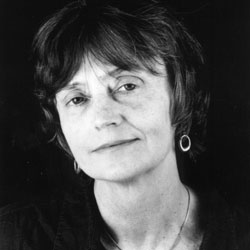The first sentence (of my poem) must be “I left it.”
What is the second sentence
The form of the wave/weave comes to me in pictures
of stars swarming to be good
in their cage.
Man on métro speaks to himself
and so he can say anything he wants.
I wish I were him
always so constricted
by you, all you, the stars.
This page is not woven yet
but any wave of light is already woven
so as I tell you the past of the glassy future
I find I need a plot to show us truth,
the graph’s coordinates quotidian life and
my life forgotten from sleep or
the unconscious which must rise up
wounded from the escape, dripping blood.
Notes on the Poem
Sometimes, one very small seeming omission from a poem can say so much, or can mystify and entrance a reader. What is missing or intentionally left out in this segment of Alice Notley's poem "Change the Forms in Dreams", from her Griffin Poetry Prize-winning collection "Disobedience"? Why is this small absence so fascinating? The second sentence of this segment, somehow rather perfectly ... "What is the second sentence" has no question mark - in fact, no punctuation at all. Isn't it crying out for that demarcation, that closure? Does the open-ended sentence denote a dreamy drifting off (since the poem title does reference dreams), or a wilful, purposeful refusal (since the collection's title is "Disobedience")? Notley suggests that she feels constrained as she points to: "stars swarming to be good in their cage." She envies the freedom of the man on the subway who can say whatever he wants as he speaks aloud but to himself. So, is the missing punctuation a small act of rebellion or indicative of weary frustration, like she doesn't know how to frame something to please those who are constricting her? Is there a clue in the first sentence? "The first sentence (of my poem) must be "I left it."" Did Notley purposefully leave it ... out? This reader loves how the absence of one question mark can produce so many in response. Isn't that amazing?
